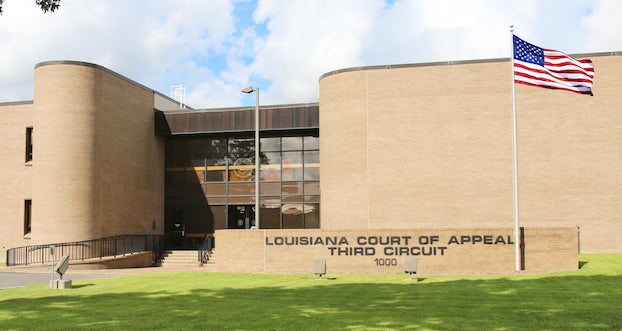Conviction stands for LC man who killed wife before she could divorce him
Published 5:34 pm Wednesday, April 24, 2024

- The 3rd Circuit Court of Appeal serves 21 parishes in Southwest and central Louisiana.
The conviction of a Lake Charles man serving life in prison for killing his wife before she could divorce him has been affirmed.
Harold Alvin Campbell was convicted in 2022 of second-degree murder for the May 1, 2019, fatal shooting of Edwina Hendricks Campbell. Their then 14-year-old daughter testified that after the couple returned from a family vacation to Jacksonville, Fla., Edwina began considering a divorce. The marriage was “toxic,” the daughter said.
Their daughter said on the day of her mother’s death, her father had gone out drinking — which had angered Edwina. She said her mother left the home to search for him twice to no avail.
A home surveillance camera recorded him eventually returning home but staying in the driveway blaring loud music from his truck, which was parked next to the master bedroom window. He then got out of the car, walked to the front porch and lit a cigarette before going inside their home.
Their daughter testified she heard her parents arguing in the kitchen when her father returned home and could hear her mother tell her father she was “done with” him and that he needed to leave. At that point, her mother went into her bedroom.
The girl testified she then heard one gunshot followed by several rapidly fired shots.
She said she assumed at the point her mother had shot her father but when she rushed to their bedroom, she saw her mother lying on the bed and her father standing over her. She said she was the one who called police.
The girl said her father left the house while she was on the phone with the operator and she locked the door to prevent her father from re-entering. She said when officers arrived she and her younger sister climbed into a police unit.
Harold also called 9-1-1 three times and those recordings were played for jurors. In the recording, Harold’s speech is slurred.
Sgt. Tony Magee’s body footage was played for jurors and in that video, Harold said, “I just couldn’t take it no more,” when asked by officers what happened.
After his arrest, Harold was placed in the unit of then-Officer Steven Fontenot. He was advised of his rights beforehand but can be seen on the unit’s camera talking to himself, saying, “I don’t know how I did that,” and “that [expletive] pushed me.” “Lord forgive me, I wasted my [expletive] life, I’m gone.” “I’m going up the river now.” “[Expletive], prison from here on out, when I had it good. I should have just left and went moved [sic] to my [expletive] trailer. Damn, I don’t know why I was that upset.” He later said that it was because he was “drunk and [expletive] up.”
Theresa Henry, a pastor at Trinity Full Gospel Ministries in Lake Charles, testified Edwina was a member of the church and had called her many times about marital strife. According to Henry, she would typically get a call from Edwina in the middle of the night because Harold would come home intoxicated, and Edwina would be afraid of what he might do.
Dr. Patrick Hayes, a board-certified psychiatrist with an addictions medicine subspecialty, testified that intoxicated individuals can still form specific intent. He said if someone is doing the same things they normally do while intoxicated, they will be less impaired than if they were put into a new situation or location. He also noted that someone who consistently drinks will be able to process and get rid of the alcohol faster than someone who rarely drinks.
Harold testified on his own behalf, admitting he shot his wife but claimed it was not intentional. He also admitted to consuming multiple bottles of beer, a pint of Hennesey, Jack Daniels, gin and Crown Royal throughout the day.
He claimed when he returned home, he mistook his wife for a male intruder. He said he crawled across the bed and came face-to-face with a man, so he jumped back and immediately began firing his handgun at the man. He said the person was sitting up against the headboard when he fired the gun.
In his appeal, Harold claims the evidence was insufficient to establish specific intent.
The 3rd Circuit Court of Appeal denied Harold’s claim saying physical evidence shows Edwina’s body was not positioned in such a way to lead credence to Harold’s claim that he shot an intruder sitting against the headboard.
“Several rounds passed through her body, and none were found to have hit the headboard of the bed, while several projectiles were retrieved from the mattress consistent with the body’s position when (officers) found it,” the court ruled.
The panel also found that the jury accepted witnesses testimony that it “felt were more truthful.”
“Under these circumstances, we cannot find that the jury abused its discretion in reaching its verdict,” the court ruled.




